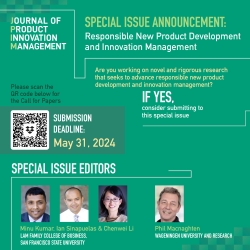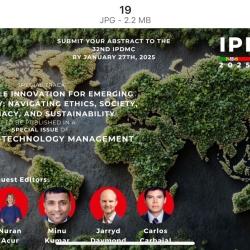The main goal of this initiative is to support high-impact and rigorous scholarship in the realm of Responsible Innovation and Entrepreneurship (RI&E) such that it supports innovation and ethics-oriented elements of the University’s mission.
This initiative is the first of its kind in a business school in the United States.
RI&E Research Program's Primary Focus
A better world is often a result of producers of products, customers (consumers/businesses), and policymakers acting responsibly. While this is as true as ever, we observe that new technologies, products (both goods and services), and companies that start with ethical missions such as “do no evil” or develop sustainable products often lose this focus as they scale in the pursuit of efficiencies through automation, new markets, revenues, and profits.
Beyond the pressures of financial stakeholders, this is a facet of how automation and the networked nature of the world are allowing entrepreneurs to scale rapidly (often without due reflection, due care, and due diligence) to launch products in the market whose unintended consequences may not be visible during development. Responsible innovation “means taking care of the future through collective stewardship of science and innovation in the present” (Stilgoe, Owen, and Macnaghten, 2013).
Responsible Innovation
Responsible innovation processes typically tend to do well on four dimensions:
- in including impacted stakeholders in the development process. It views the natural environment as an always-impacted stakeholder with special status. Unlike other stakeholders, it is without agency or voice but is always harnessed in the creation and delivery of products.
- in anticipating adverse effects of technology at the micro (customers/consumers), meso (users and non-users), and macro levels (socio-ecological)
- in being reflexive at the level of institutional practice (means holding a mirror up to one’s own activities, commitments, assumptions, being aware of the limits of knowledge, and being mindful that a particular framing of an issue may not be universally held)
- in being responsive by shaping the direction of Innovation in response to changing stakeholder and socio-ecological concerns (Stilgoe, Owen, and Macnaghten, 2013).
As new classes of technologies (e.g., gene editing, Generative AI, implantable brain–computer interfaces, anti-aging) are developed in the future, they will concomitantly reveal new human conditions that can be exploited, thus creating new classes of responsibilities. For example, the responsibility for privacy did not arise until cameras were developed in the second half of the nineteenth century. We hope this work helps innovation professionals build anticipatory safety measures into products, helps them circumvent legal actions ( Tort liability or class action lawsuits) or regulatory enforcements, and, more generally, build more resilient products.
Responsible Entrepreneurship
From an entrepreneurship standpoint, the initiative will explore how companies that positively affect the environment and society can scale/not scale without compromising the "do no evil" or similar core missions that got them started and still remain profitable. Notably, the program will also explore the challenges mission/purpose-driven organizations face when commercializing responsible innovations and the business imperatives that come with the need to/not to scale and remain profitable. We see a few elements critical to this effort; responsible leadership (Voegtlin, Patzer, and Scherer 2012), developing eco-socially sustainable (Bocken et al. 2014) and regenerative (as opposed to extractive) business models, company culture, and setting up governance mechanisms (incentives, Key Consequence Indices, Key Performance Indices, oversight, etc.). For instance, here are the key differences among extractive and regenerative business models:
| Feature | Extractive Model | Regenerative Model |
|---|---|---|
| Resource Use | Depletes natural and social capital | Rebuilds and enhances capital |
| Value Orientation | Profit-maximization | Profit and holistic value creation |
| Environmental Impact | Often negative and externalized | Net positive or restorative |
| Time Horizon | Short-term focused | Long-term resilience focused |
| Business Logic | Linear (“take–make–waste”) | Circular or regenerative |
| Stakeholder Perspective | Shareholder-centric | Multi-stakeholder-perspective |
The work of this research group should help ethical and mission-oriented companies scale/or not scale such that the ethical core endures and they are organized for responsibility rather than have "organized irresponsibility."
Watch Professor Ian Sinapuelas explain the idea of Responsible Innovation in the short YouTube videos below. For a more in-depth presentation, follow the trail of videos on the RIE YouTube Channel.
Explore Programmatic Components
Student Involvement
News

Minu Kumar's accepted paper at Journal of Marketing
Professor Minu Kumar's paper about Responsible Design Thinking is accepted and Forthcoming at the Journal of Marketing (UT Dallas Journal). See below for more details:
Kumar, M., Micheli, P., Singh, J. J., & Goldberg, N. EXPRESS: Responsible Design Thinking. Journal of Marketing, 00222429251396423.

Chenwei Li's accepted paper at Journal of Business Ethics
Professor Chenwei Li has a paper accepted at the Journal of Business Ethics (FT 50 Journal). See below for more details:
Li, C., Reich, T., Wu, C., & Lee, C. (accepted). Creative Unethicality and Its Ripple Effect in Competitive Settings: A Perceived Relative Deprivation Perspective. Journal of Business Ethics.

Journal Special Issue
The leadership of the RI&E Research Initiative are editing a Special Issue on Responsible Innovation for the Journal of Product Innovation Management (ABDC A*, AJG 4 Journal) with Phil Macnaghten. See below for more details:
Kumar, Minu, Sinapuelas, Ian C, Macnaghten, Phillip, and Li, Chenwei (Ongoing Special Issue expected to be published in 2026) “Special issue: Responsible New Product Development and Innovation Management.” Journal of Product Innovation Management. See this Link: https://onlinelibrary.wiley.com/pb-assets/assets/15405885/JPIM_RI_Speci…

Research-Technology Management Special Issue
RI&E Research Initiative's Founder Director, Minu Kumar, is editing a special issue on Responsible Innovation in Research-Technology Management (ABDC A Journal). See below for more information:
Acur, Nuran, Jarryd Daymond, Carlos Carbajal, and Minu Kumar (Ongoing Special Issue expected to be published in 2027) "Responsible Innovation for Emerging Technology: Navigating Ethics, Society, Diplomacy, and Sustainability," Research-Technology Management. Click this Link for more details about submissions.
References
Bocken, N. M., Short, S. W., Rana, P., & Evans, S. (2014). A literature and practice review to develop sustainable business model archetypes. Journal of cleaner production, 65, 42-56.
Stilgoe, J., Owen, R., & Macnaghten, P. (2013). Developing a framework for responsible innovation. Research Policy, 42(9), 1568-1580.
Voegtlin, C., Patzer, M., & Scherer, A. G. (2012). Responsible leadership in global business: A new approach to leadership and its multi-level outcomes. Journal of business ethics, 105, 1-16.
Initiative Leadership and Partners
The Responsible Innovation & Entrepreneurship Research Initiative relies upon the interdisciplinary expertise and generosity of scholars from various departments in the college, across the local region, country, and internationally to bring its offerings to life. Please see here for more information.
